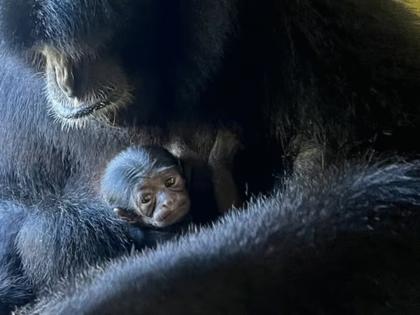Baby ape born at Tampa zoo is endangered species and 'sign of hope'
Published in Lifestyles
TAMPA, Fla. -- An endangered species of ape, a siamang, was born at ZooTampa at Lowry Park last Sunday night. The zoo called it “a sign of hope for the species.”
Siamangs are the largest of the lesser (meaning smaller) apes that are native to Malaysia, Indonesia and Thailand, and they are listed as endangered. They play an important role in keeping the forest healthy because they disperse the seeds of the fruit they eat. They mate for life and have a song, or series of calls, unique to the pair that they use to communicate.
ZooTampa said the siamang baby was born in the evening hours of Sunday, Oct. 27, to mother Hutan and father Sensei. But they don’t yet know if it’s a boy or a girl.
The little siamang, who joins sister Kazuki (age 3), is clinging to its mother tightly and has been observed nursing.
“It will be a few weeks before the sex of the baby is known,” the zoo said. “Both mom and baby are doing well.”
Visitors to the zoo can see the baby in the siamang habitat in the Primate Area of the zoo, a spokeswoman said.
Siamangs, the largest of the gibbon species, are black furred apes with long arms and opposable thumbs and long toes. They form extremely tight family bonds and fathers play a significant role in raising the young, unlike many species in the wild, according to the Smithsonian National Zoo.
“The entire ZooTampa family is very excited about the expansion of our siamang family,” said Chris Massaro, chief zoological officer of the Tampa zoo. “Siamangs are endangered, so every birth is extremely important and a sign of hope for the species. The baby is doing well and guests visiting the zoo may get a glimpse of the new arrival in the coming days.”
Siamang gibbons live in treetops in tropical forests. They are listed as endangered on the IUCN Red List (a critical indicator of the health of the world’s biodiversity) due to habitat destruction, degradation and fragmentation of their habitats, and opportunistic poaching.
©2024 Tampa Bay Times. Visit at tampabay.com. Distributed by Tribune Content Agency, LLC.
























Comments